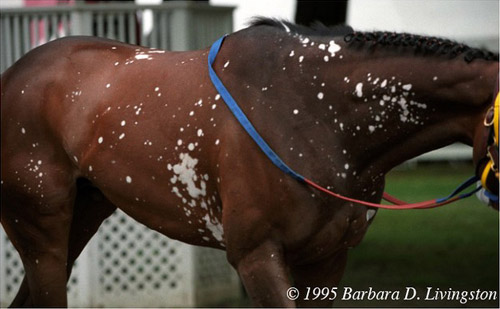My chestnut mare has always had little white dots around her ears, and even some little white areas in her mane.
She has absolutely no appaloosa/paint/whatever in her.
She's a TB/Arab/Oldenburg cross.
I've never thought anything of it, until recently, now within the last few weeks she's been getting little white dots in random places.
Her flank, side of her belly, her butt, shoulder.
It's not from her saddle or any other tack because all through summer I've been riding her bareback. So nothing is causing unwanted pressure, and it's not from a bite or kick from another horse and hair just grew back white.
Just one day she has just one or two dots and the next she has another! I've asked my old trainer about it, and she suggested that maybe it was genetic. And it may be, but I'm concerned that there's a slight chance it may be something else.
We just got a new chestnut QH gelding at the stable i work at for trail rides. The horse is older and he lived by himself and was super fat before he came to us. Now he's in shape, lives with 4 other geldings, and has a rump full of dots! He had no dots what-so-ever when he first came or even for the first few months. It has only happened just recently. My mare and this gelding aren't in the same paddock together, and they never come in contact with each other at any other time. Could this be from stress? Maybe for the gelding? But my mare has lived at the stable her whole life, she's at a good weight, she doesn't seem any different. She seems perfectly happy to me. Just wondering if you guys know what causes these mystery dots, or if you ever had a horse with the same thing?
She has absolutely no appaloosa/paint/whatever in her.
She's a TB/Arab/Oldenburg cross.
I've never thought anything of it, until recently, now within the last few weeks she's been getting little white dots in random places.
Her flank, side of her belly, her butt, shoulder.
It's not from her saddle or any other tack because all through summer I've been riding her bareback. So nothing is causing unwanted pressure, and it's not from a bite or kick from another horse and hair just grew back white.
Just one day she has just one or two dots and the next she has another! I've asked my old trainer about it, and she suggested that maybe it was genetic. And it may be, but I'm concerned that there's a slight chance it may be something else.
We just got a new chestnut QH gelding at the stable i work at for trail rides. The horse is older and he lived by himself and was super fat before he came to us. Now he's in shape, lives with 4 other geldings, and has a rump full of dots! He had no dots what-so-ever when he first came or even for the first few months. It has only happened just recently. My mare and this gelding aren't in the same paddock together, and they never come in contact with each other at any other time. Could this be from stress? Maybe for the gelding? But my mare has lived at the stable her whole life, she's at a good weight, she doesn't seem any different. She seems perfectly happy to me. Just wondering if you guys know what causes these mystery dots, or if you ever had a horse with the same thing?










